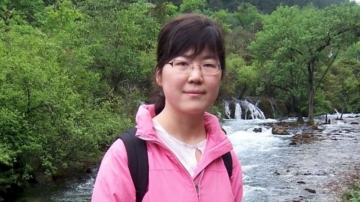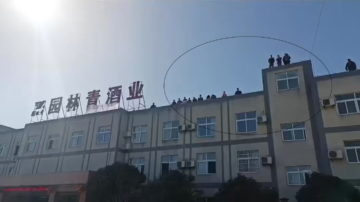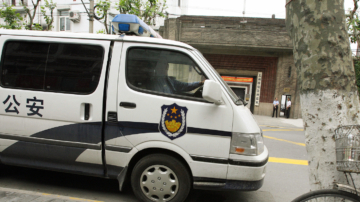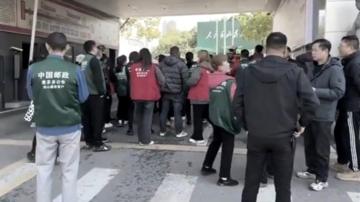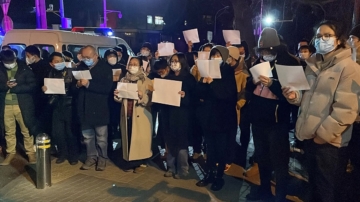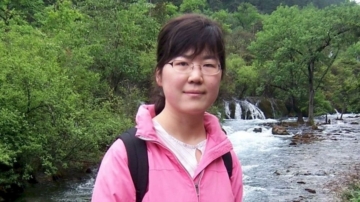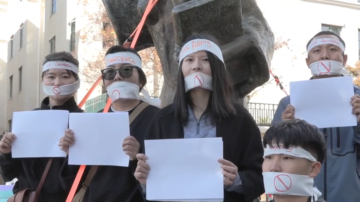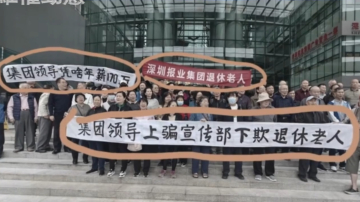【新唐人2013年07月22日讯】7月20号,北京首都机场惊爆人肉炸弹事件,一名山东男子因遭暴力执法殴打致残,申诉无门,绝望之下选择在机场引爆自制炸药,当场除这名男子重伤外,没有其他人员伤亡。社会观察人士指出,随着中共暴政的进一步升级,将会有越来越多走投无路的民众选择极端的方式宣泄冤情。而机场爆炸事件就是中共大崩溃的前兆。
据爆炸现场目击者证实,这名残疾男子先是在机场散发传单,被机场人员阻止后,又拿出自制的炸药高呼要引爆,在多次警告附近旅客保持距离之后,才将炸弹点燃,因此没有造成人员伤亡。
大陆媒体报导,这名残疾男子名叫冀中星,今年34岁,是从山东到广东东莞打工的农民。在冀中星2006年发表的博客文章中显示,2005年他在东莞骑摩托车载客时,遇警察巡逻查车,将他追到当地治安队门口,多名治安队员对他暴力围殴,导致他下身瘫痪,但因家境贫困无力治疗,欠债10多万。
武汉人权活动家秦永敏:“现在中国大陆出现很多制度性问题,导致了上级部门向下授权作恶,只要你保证不出事,你怎么样达到目地我们不管,下级部门往往就无所不为,作出大量为了所谓维稳,而坑害平民百姓。”
冀中星的遭遇曾经得到了两名大陆律师的同情,决定为他提供法律援助,并向当地警方提出了行政诉讼及索赔,但被法院以“证据不足”为由,两次判处败诉。那两名律师也受到当地政府的压力,最终不敢再多说话。
中国公民监政会发起人郭永丰:“都是欺软怕硬的,看你好欺负他就打你、骂你。没有甚么法律意识、法律观念,包括这些政府机关也是看你人的,如果看你是强势的,肯定给你办案,你如果是个弱势的,他恨不得敲诈勒索你。这个本身就是流氓政府。”
八年来,冀中星多次上访,包括向中共中央政法委员会和信访局投诉,但都没有得到答复和解决,他的家人曾对媒体记者哭诉“叫天天不应,叫地地不灵”,“有冤无处伸”。
郭永丰:“现在现有的制度保证当权者的私利,它不保护普通老百姓的利益。老百姓有甚么事的话,没关系、没后台、没有雄厚实力的话,基本上上访是一条死路。官官相护是独裁专制制度的一个本性。”
最终,失去一切生活希望的冀中星,选择了极端方式表达自己的冤情。然而,这种机场爆炸事件在大陆并非个案,从杨佳杀警到山东腾家镇政府爆炸案,再到今年的厦门公车爆炸案... 这些案例的共同特征就是:都是绝望的访民和冤民。
秦永敏:“中国所有的这些问题,说到底就是一条,那就是执政党它们的所作所为不受制约,所以它就为所欲为、不择手段的伤害民众,导致了很多民众利益严重受损、走投无路、投告无路,只有死路一条。在这种情况下,他们走极端就很容易理解的了。
武汉人权活动家秦永敏还指出,中共继续倒行逆施,将会使这类个案的极端事件变成全社会性质的矛盾。
秦永敏:“这都是制度弊病在一定情况下形成了官逼民反的局面,所以走极端的人越来越多。北京残疾人爆炸案,应该说是中国社会走向大动荡的一个警示,一个信号。”
21号晚,“英国广播公司《BBC》”中文网引述冀中星的兄长冀中吉的消息说,冀中星在山东菏泽鄄城县老家的父亲已被当局控制,冀中星被送往北京积水潭医院截肢后下落不明。
采访编辑/张天宇 后制/李勇
Beijing Airport Bombing: Early Sign of Big Social Upheaval
On July 20, a suicide bombing occurred in Beijing
International Airport.
A man, after years of no-official-answer petitioning,
set off his homemade bomb in despair.
The petitioner only injured himself,
there were no other casualties.
Social observers say, the Chinese Communist Party (CCP)
has continued its tyranny without let up.
This will only drive more ordinary people to become
desperate, and to vent their anger in an extreme way.
The airport bombing is an early sign of
the CCP's final collapse.
Witnesses at the scene told media that at the airport,
the disabled man first of all distributed leaflets.
Later, he held a homemade bomb, and shouted to warn
that he was letting it off.
After repeated warnings to onlookers to keep
a distance from him, the man ignited the bomb.
No other casualty was caused during the incident.
China's media reports that the man, Ji Zhongxing, 34,
is a Shandong farmer working at Dongguan, Guangdong.
In 2005, Ji earned a living in Dongguan by
carrying passengers using his own motorcycle.
He was later tracked down by local police and
assaulted by vigilantes, he was left paralyzed by injuries.
He was not able to afford medical care, and fell heavily
into debt to the tune of over 100,000 yuan.
(Rights activist, Wuhan) Qin Yongmin: “There exist
massive institutional problems in today's China.
High level government departments authorize
subordinate branches to do evil deeds.
Law violations are encouraged, as long as
death is not caused by the violence used.
So they've done a large amount of 'stability preservation'
work, but have relentlessly victimized civilians."
Two sympathetic lawyers have filed administrative
litigation and claims on Ji Zhongxing's behalf.
Yet they have twice lost lawsuits because of having
"insufficient evidence".
Both lawyers, pressured by local CCP authorities,
have finally been forced to remain silent on the matter.
(Founder, Chinese Citizen Watchdog) Guo Yongfeng:
“They all are bullies. There's no observance of the law.
Those same public officials, would surely be of service
to you if you had a strong background and credentials.
If you're disadvantaged, they just itch to threaten and
blackmail you. This, surely, is a rogue government.”
Ji Zhongxing has kept on petitioning
during the past eight years.
He has aired his grievances towards the Central Political
& Legislative Affairs Committee and to the Petitioning Office.
But he has never received any response.
His family members once told media,
“There's no place to seek justice at all.”
Guo Yongfeng: “The current social system exists to
protect the ruling strata only.
Ordinary citizens' interests are ignored, so basically,
petitioning is a dead-end road for them.
It is the basic nature of an authoritarian political system that
officials shield each other when problems or disputes arise.”
Ji Zhongxing, finally in despair, chose to
air his grievances in a extreme way.
Today, resorting to bombing as a last resort, in frustration,
is no longer an exceptional occurrence in China.
From Yang Jia's killing police in Shanghai,
to the bombing of the town hall in Rongcheng, Shandong,
right up until this year's bus bombing in Xiamen …
all these accidents have a common feature——they
have all involved desperate and devastated petitioners.
Qin Yongmin: “All the problems in China are actually one,
the power of the ruling party is unchecked.
It does anything it likes, and harms civilians
as much as it needs to.
This has driven too many people to desperation.
In this case, it's easily understood why
extreme measures became necessary”
Qin Yongmin remarks that the retrograding ruling of
the communists will result in the contradictions through out the whole society of China.
Qin Yongmin: “The party ruling system have formed
oppressions from the officials, which has pushed people have to revolt.
It's no surprise to see more occurrences of
people going to extremes through sheer frustration.
The Beijing airport bombing is a sign that
a big social upheaval may occur in China soon.”
On July 21, BBC Chinese website quoted
Ji Zhongxing's brother.
He said that their father, residing in Heze, Shandong,
has been under the control of local CCP authorities.
Ji Zhongxing himself had disappeared after being sent to
Beijing Jishuitan Hospital for an amputation.
据爆炸现场目击者证实,这名残疾男子先是在机场散发传单,被机场人员阻止后,又拿出自制的炸药高呼要引爆,在多次警告附近旅客保持距离之后,才将炸弹点燃,因此没有造成人员伤亡。
大陆媒体报导,这名残疾男子名叫冀中星,今年34岁,是从山东到广东东莞打工的农民。在冀中星2006年发表的博客文章中显示,2005年他在东莞骑摩托车载客时,遇警察巡逻查车,将他追到当地治安队门口,多名治安队员对他暴力围殴,导致他下身瘫痪,但因家境贫困无力治疗,欠债10多万。
武汉人权活动家秦永敏:“现在中国大陆出现很多制度性问题,导致了上级部门向下授权作恶,只要你保证不出事,你怎么样达到目地我们不管,下级部门往往就无所不为,作出大量为了所谓维稳,而坑害平民百姓。”
冀中星的遭遇曾经得到了两名大陆律师的同情,决定为他提供法律援助,并向当地警方提出了行政诉讼及索赔,但被法院以“证据不足”为由,两次判处败诉。那两名律师也受到当地政府的压力,最终不敢再多说话。
中国公民监政会发起人郭永丰:“都是欺软怕硬的,看你好欺负他就打你、骂你。没有甚么法律意识、法律观念,包括这些政府机关也是看你人的,如果看你是强势的,肯定给你办案,你如果是个弱势的,他恨不得敲诈勒索你。这个本身就是流氓政府。”
八年来,冀中星多次上访,包括向中共中央政法委员会和信访局投诉,但都没有得到答复和解决,他的家人曾对媒体记者哭诉“叫天天不应,叫地地不灵”,“有冤无处伸”。
郭永丰:“现在现有的制度保证当权者的私利,它不保护普通老百姓的利益。老百姓有甚么事的话,没关系、没后台、没有雄厚实力的话,基本上上访是一条死路。官官相护是独裁专制制度的一个本性。”
最终,失去一切生活希望的冀中星,选择了极端方式表达自己的冤情。然而,这种机场爆炸事件在大陆并非个案,从杨佳杀警到山东腾家镇政府爆炸案,再到今年的厦门公车爆炸案... 这些案例的共同特征就是:都是绝望的访民和冤民。
秦永敏:“中国所有的这些问题,说到底就是一条,那就是执政党它们的所作所为不受制约,所以它就为所欲为、不择手段的伤害民众,导致了很多民众利益严重受损、走投无路、投告无路,只有死路一条。在这种情况下,他们走极端就很容易理解的了。
武汉人权活动家秦永敏还指出,中共继续倒行逆施,将会使这类个案的极端事件变成全社会性质的矛盾。
秦永敏:“这都是制度弊病在一定情况下形成了官逼民反的局面,所以走极端的人越来越多。北京残疾人爆炸案,应该说是中国社会走向大动荡的一个警示,一个信号。”
21号晚,“英国广播公司《BBC》”中文网引述冀中星的兄长冀中吉的消息说,冀中星在山东菏泽鄄城县老家的父亲已被当局控制,冀中星被送往北京积水潭医院截肢后下落不明。
采访编辑/张天宇 后制/李勇
Beijing Airport Bombing: Early Sign of Big Social Upheaval
On July 20, a suicide bombing occurred in Beijing
International Airport.
A man, after years of no-official-answer petitioning,
set off his homemade bomb in despair.
The petitioner only injured himself,
there were no other casualties.
Social observers say, the Chinese Communist Party (CCP)
has continued its tyranny without let up.
This will only drive more ordinary people to become
desperate, and to vent their anger in an extreme way.
The airport bombing is an early sign of
the CCP's final collapse.
Witnesses at the scene told media that at the airport,
the disabled man first of all distributed leaflets.
Later, he held a homemade bomb, and shouted to warn
that he was letting it off.
After repeated warnings to onlookers to keep
a distance from him, the man ignited the bomb.
No other casualty was caused during the incident.
China's media reports that the man, Ji Zhongxing, 34,
is a Shandong farmer working at Dongguan, Guangdong.
In 2005, Ji earned a living in Dongguan by
carrying passengers using his own motorcycle.
He was later tracked down by local police and
assaulted by vigilantes, he was left paralyzed by injuries.
He was not able to afford medical care, and fell heavily
into debt to the tune of over 100,000 yuan.
(Rights activist, Wuhan) Qin Yongmin: “There exist
massive institutional problems in today's China.
High level government departments authorize
subordinate branches to do evil deeds.
Law violations are encouraged, as long as
death is not caused by the violence used.
So they've done a large amount of 'stability preservation'
work, but have relentlessly victimized civilians."
Two sympathetic lawyers have filed administrative
litigation and claims on Ji Zhongxing's behalf.
Yet they have twice lost lawsuits because of having
"insufficient evidence".
Both lawyers, pressured by local CCP authorities,
have finally been forced to remain silent on the matter.
(Founder, Chinese Citizen Watchdog) Guo Yongfeng:
“They all are bullies. There's no observance of the law.
Those same public officials, would surely be of service
to you if you had a strong background and credentials.
If you're disadvantaged, they just itch to threaten and
blackmail you. This, surely, is a rogue government.”
Ji Zhongxing has kept on petitioning
during the past eight years.
He has aired his grievances towards the Central Political
& Legislative Affairs Committee and to the Petitioning Office.
But he has never received any response.
His family members once told media,
“There's no place to seek justice at all.”
Guo Yongfeng: “The current social system exists to
protect the ruling strata only.
Ordinary citizens' interests are ignored, so basically,
petitioning is a dead-end road for them.
It is the basic nature of an authoritarian political system that
officials shield each other when problems or disputes arise.”
Ji Zhongxing, finally in despair, chose to
air his grievances in a extreme way.
Today, resorting to bombing as a last resort, in frustration,
is no longer an exceptional occurrence in China.
From Yang Jia's killing police in Shanghai,
to the bombing of the town hall in Rongcheng, Shandong,
right up until this year's bus bombing in Xiamen …
all these accidents have a common feature——they
have all involved desperate and devastated petitioners.
Qin Yongmin: “All the problems in China are actually one,
the power of the ruling party is unchecked.
It does anything it likes, and harms civilians
as much as it needs to.
This has driven too many people to desperation.
In this case, it's easily understood why
extreme measures became necessary”
Qin Yongmin remarks that the retrograding ruling of
the communists will result in the contradictions through out the whole society of China.
Qin Yongmin: “The party ruling system have formed
oppressions from the officials, which has pushed people have to revolt.
It's no surprise to see more occurrences of
people going to extremes through sheer frustration.
The Beijing airport bombing is a sign that
a big social upheaval may occur in China soon.”
On July 21, BBC Chinese website quoted
Ji Zhongxing's brother.
He said that their father, residing in Heze, Shandong,
has been under the control of local CCP authorities.
Ji Zhongxing himself had disappeared after being sent to
Beijing Jishuitan Hospital for an amputation.

